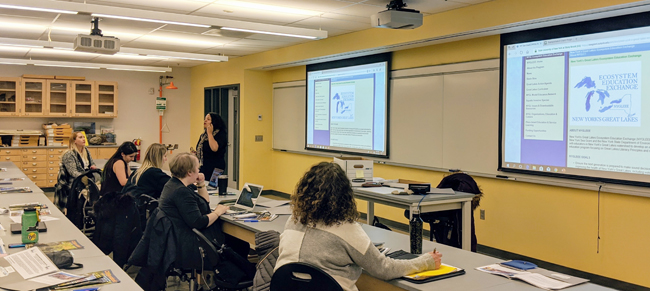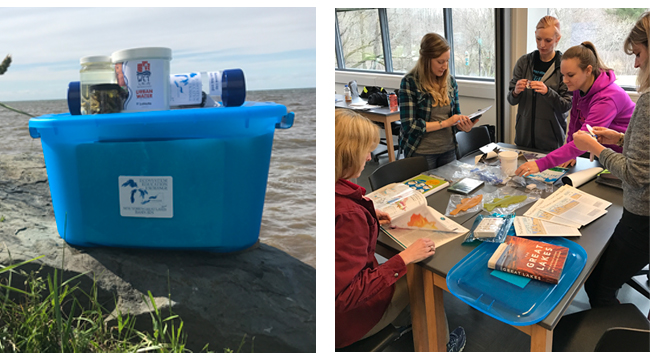
Monica L. Miles, New York Sea Grant's Coastal Literacy Specialist, discusses "Great Lakes Ecosystem Education Exchange," a partner Web resource site with NYS Department of Environmental Conservation, with educators at a recent training. Miles is based at the University at Buffalo, where she is also Associate Director of the Great Lakes Program. Credit: Monica Lynn Miles/NYSG.
Contact:
Monica L. Miles, PhD, NYSG Great Lakes Literacy Educator, E: mlm473@cornell.edu, P: 716-645-3610
Buffalo, NY, January 24, 2020 - "Grant Writing for Educators to Promote Environmental Education," a two-part workshop organized by New York Sea Grant (NYSG), the New York State Department of Environmental Conservation (NYSDEC), Penn Dixie, Buffalo State College, and New York State Parks, is helping to increase awareness for over a dozen K-12 western New York teachers on funding opportunities that support experiential environmental education. The 14 teachers and educators who attended this late January workshop reach over 700 students in their classes and programs.
This workshop was a training ground for educators to understand available grants and how to apply for funding to support integrating place based environmental education in the classroom and covering the costs for field trips and stewardship projects.
"We provided information on grant opportunities that are available and how to apply for funding independently and in partnership with environmental education nonprofits, higher education community programs, and/or state entities," said Monica L. Miles, NYSG's Coastal Literacy Specialist.
"We also shared the Launch of the new 'funding opportunities' link on the GLEEE website."
In addition to the new content on the Great Lakes Ecosystem Education Exchange, there's new funding opportunity information on another NYSG-NYSDEC partner Web site, New York’s Great Lakes.

Another resource that NYSG and NYSDEC continues to provide for educators are Great Lakes Basin Bins, which are each filled with educational materials, curricula, information and preserved specimens. The Basin Bins, available on loan, allow educators to efficiently infuse Great Lakes science into existing teaching plans at no expense.
The Basin Bins include 25 hands-on resources such as a life-size replica of a Lake Sturgeon, Round goby and Sea Lamprey specimen, a resource notebook full of fact sheets and much more. The bins are classroom-ready with Great Lakes-related activities to help educate students on ecosystem topics ranging from dichotomous keys to overall Great Lakes knowledge.
For more on Miles, who joined NYSG last September, see "New York Sea Grant Extension, UB Welcome New Great Lakes Literacy Educator."
More Info: New York Sea Grant
New York Sea Grant (NYSG), a cooperative program of Cornell University
and the State University of New York (SUNY), is one of 34 university-based
programs under the National Oceanic and Atmospheric Administration’s
National Sea Grant College Program.
Since 1971, NYSG has represented a statewide network of integrated
research, education and extension services promoting coastal community
economic vitality, environmental sustainability and citizen awareness
and understanding about the State’s marine and Great Lakes resources.
Through NYSG’s efforts, the combined talents of university scientists
and extension specialists help develop and transfer science-based
information to many coastal user groups—businesses and industries,
federal, state and local government decision-makers and agency managers,
educators, the media and the interested public.
The program maintains Great Lakes offices at Cornell University, SUNY
Buffalo, SUNY Oswego and the Wayne County Cooperative Extension office
in Newark. In the State's marine waters, NYSG has offices at Stony Brook
University in Long Island, Brooklyn College and Cornell Cooperative
Extension in NYC and Kingston in the Hudson Valley.
For updates on Sea Grant activities: www.nyseagrant.org has RSS, Facebook, Twitter, and YouTube links. NYSG offers a free e-list sign up via www.nyseagrant.org/nycoastlines for its flagship publication, NY Coastlines/Currents, which is published quarterly. Our program also produces an occasional e-newsletter,"NOAA Sea Grant's Social Media Review," via its blog, www.nyseagrant.org/blog.